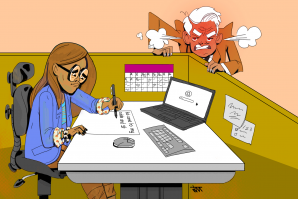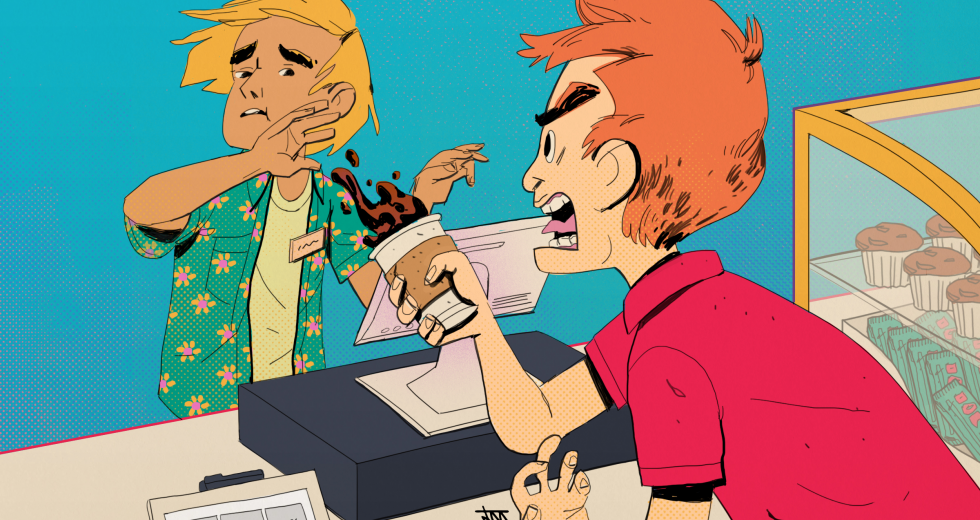I own a retail business, and sometimes customers can be rude and inappropriate, but I’m worried about a recession, so the customer is always right. I can’t afford bad ratings on Yelp or whatever. But my HR manager says I can be held liable for what customers do. Is this true?
Your HR manager is correct.
Now, there’s no law against general rudeness. Customers who are just all-around jerks won’t cause you to get in legal trouble. But allowing those customers to abuse your employees may mean your best employees quit. Losing an employee is probably more expensive than losing a customer. The customer is not always right — and is sometimes profoundly wrong. Tolerating abuse encourages bad behavior and tells your employees that you don’t care about them.
But that was not your question. You want to know the lines. Here they are.
You have an obligation to protect your employees.
There is, of course, a moral obligation to treat your employees well, which means not allowing customers to treat them terribly.
But you also have a legal obligation to protect them from harassment on the basis of sex, race, national origin, religion or ancestry. Title VII of the Civil Rights Act of 1964 requires an employer to maintain a harassment-free workplace. California law goes a step further with the Fair Employment and Housing Act: It kicks in at five employees, rather than the 15 required for protection under federal law.
With these combined, here’s the basic premise: If a manager, supervisor or another company representative (which generally includes HR) knows or should know about harassment by a customer and does not do anything about it, the company is legally liable, just as if it were another employee harassing the victim.
What constitutes legal harassment?
You don’t know what someone will say after walking into your store, and the law doesn’t require you to. You don’t have to screen customers. But once they open their mouths (or worse, physically attack your employee), you must act as soon as possible.
Not every dirty joke or comment rises to the level of illegal harassment. Here’s what it takes to count as a hostile work environment:
The harassment is based on a protected characteristic. So a customer throwing a generic tantrum about prices doesn’t count, but the same tantrum where the customer includes racial slurs would.
The employee experienced unwelcome harassment. This may seem silly, but if the employee’s boyfriend comes in and talks dirty and she is happy about it, it’s not considered unwelcome.
The behavior is pervasive and affects the employee’s work environment. A one-time sexual comment or racial slur probably doesn’t create a hostile work environment (but there may be exceptions).
What this looks like:
A customer comes in regularly, makes dirty jokes, keeps on asking Jane out and repeatedly “adjusts” his crotch in front of her. Jane has asked him to stop and informed her supervisor about the situation.
This fits all three requirements: The harassment is based on Jane’s sex, the harassment is unwelcome, and it’s pervasive — it happens repeatedly. Now that you know about it, you’re responsible to take action.
What does that look like? You can ban the customer from your store. You can talk with him and let him know if his behavior doesn’t change, you will legally ban him from the store. You can accompany him every time he enters the store, so Jane never has to deal with him.
What you can’t do is ignore the problem or tell Jane to toughen up because “he’s harmless,” or “the customer is always right,” or “we do whatever it takes to make a sale.” Now that you know, you have to act, and you have to stop it.
If a customer insults your employee for wearing a hijab, that falls under religion. If a customer attacks your employee because of the employee’s race or accent, that’s also illegal. “I’m sorry, I can’t understand what you’re saying” is not harassment. “When are you going to learn to speak English? You’re in America now!” may rise to that level.
What you have to do:
First, thank your HR manager for bringing this to your attention. Second, let your employees know they must report this kind of customer behavior. Third, you have to take action.
This may mean a customer stops shopping at your store. It may mean a bad Yelp review. But those things are likely to be much cheaper than an employee lawsuit and much better for your employees and your business. Keeping your employees happy and safe at work reduces your turnover costs. Getting rid of the jerk customers makes your store a better place for nice humans.
If you ignore the problem, the horrible people never learn to behave, you open yourself up to lawsuits, and your good employees are likely to quit. It’s hardly the best way to do business.
So speak up and act when customers behave badly. It’s the right thing to do, and it’s the law.
–
Stay up to date on business in the Capital Region: Subscribe to the Comstock’s newsletter today.
Recommended For You

Dilemma of the Month: How Do You Document Harassment Without Getting Yourself in Hot Water?
HR people often advise victims of harassment to “just document everything!” without explaining how to go about it. Here’s a quick guide to what you need to do when you’re documenting harassment.

Dilemma of the Month: My Employee Is Lunching With a Player. Should I Warn Her?
An employer seeks answers about the ethics and boundaries of commenting on an employee’s personal life.

Dilemma of the Month: How Can I Attract Entry-Level Candidates Without Raising Pay?
An employer struggles with how to attract entry-level applicants without being able to increase their wages.

What Does the New Workplace Harassment Guide for California Employers Mean For Your Business?
Watch any news channel, listen to any talk radio station or read virtually any online news or social media feed, and chances are, you’ll learn about a new lawsuit being filed against a company based on allegations of harassment, discrimination or retaliatory conduct in the workplace.

Dilemma of the Month: He Said, She Said
We have a female employee who reported sexual harassment from a male coworker. The woman didn’t want to come forward, but once the CEO found out, he felt he had an obligation to handle the claim. We currently are without an HR manager. What is the proper way to handle this? Should an investigation be made?

Cyberbullies in the Workplace
Five ways to protect employees from virtual harassment
The emergence of remote work has broadened the horizons for
cyberbullying. We share the warning signs and five ways to
protect employees.

Dilemma of the Month: What should I do with an employee who won’t stop complaining?
A manager frustrated with an employee who frequently complains wonders if the problem lies with their management style, the team or the employee. Evil HR Lady offers perspective and potential solutions.





Comments
So interesting!!! thanks
#Fight meeting mania